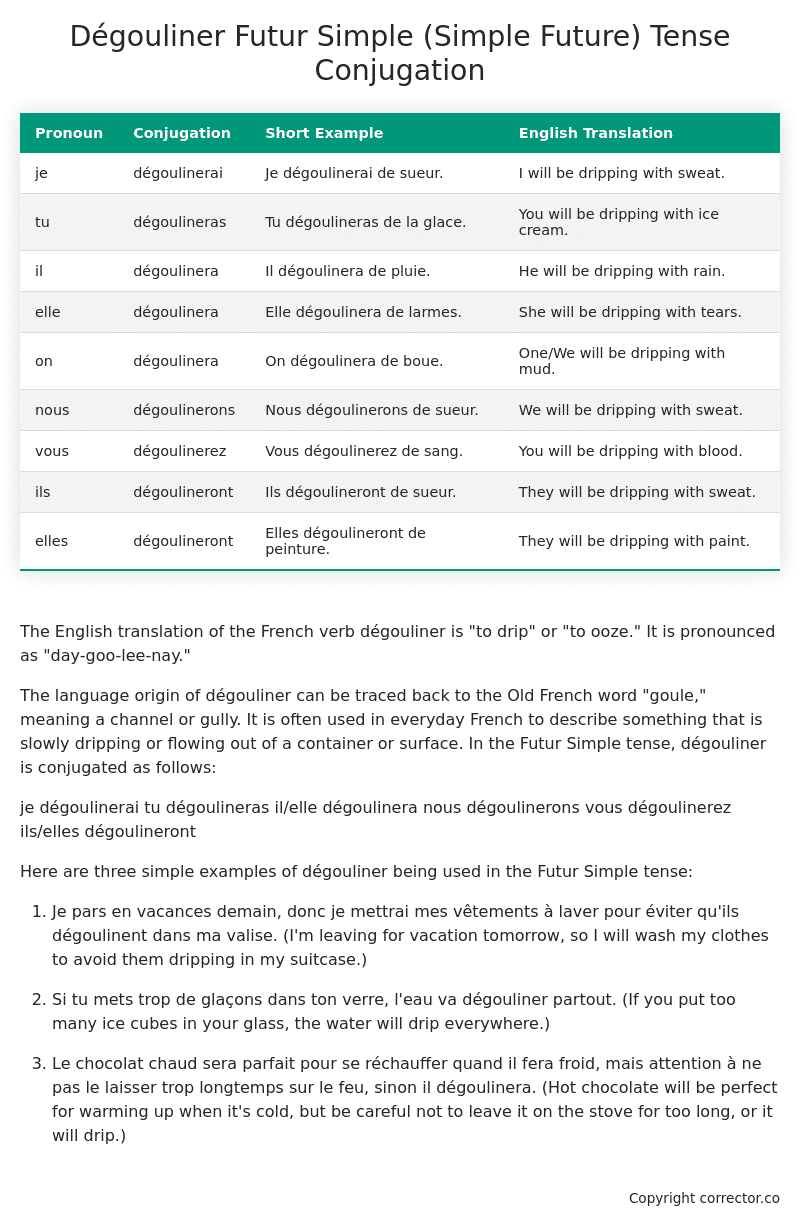Futur Simple (Simple Future) Tense Conjugation of the French Verb dégouliner
Introduction to the verb dégouliner
The English translation of the French verb dégouliner is “to drip” or “to ooze.” It is pronounced as “day-goo-lee-nay.”
The language origin of dégouliner can be traced back to the Old French word “goule,” meaning a channel or gully. It is often used in everyday French to describe something that is slowly dripping or flowing out of a container or surface. In the Futur Simple tense, dégouliner is conjugated as follows:
je dégoulinerai
tu dégoulineras
il/elle dégoulinera
nous dégoulinerons
vous dégoulinerez
ils/elles dégoulineront
Here are three simple examples of dégouliner being used in the Futur Simple tense:
-
Je pars en vacances demain, donc je mettrai mes vêtements à laver pour éviter qu’ils dégoulinent dans ma valise. (I’m leaving for vacation tomorrow, so I will wash my clothes to avoid them dripping in my suitcase.)
-
Si tu mets trop de glaçons dans ton verre, l’eau va dégouliner partout. (If you put too many ice cubes in your glass, the water will drip everywhere.)
-
Le chocolat chaud sera parfait pour se réchauffer quand il fera froid, mais attention à ne pas le laisser trop longtemps sur le feu, sinon il dégoulinera. (Hot chocolate will be perfect for warming up when it’s cold, but be careful not to leave it on the stove for too long, or it will drip.)
Table of the Futur Simple (Simple Future) Tense Conjugation of dégouliner
| Pronoun | Conjugation | Short Example | English Translation |
|---|---|---|---|
| je | dégoulinerai | Je dégoulinerai de sueur. | I will be dripping with sweat. |
| tu | dégoulineras | Tu dégoulineras de la glace. | You will be dripping with ice cream. |
| il | dégoulinera | Il dégoulinera de pluie. | He will be dripping with rain. |
| elle | dégoulinera | Elle dégoulinera de larmes. | She will be dripping with tears. |
| on | dégoulinera | On dégoulinera de boue. | One/We will be dripping with mud. |
| nous | dégoulinerons | Nous dégoulinerons de sueur. | We will be dripping with sweat. |
| vous | dégoulinerez | Vous dégoulinerez de sang. | You will be dripping with blood. |
| ils | dégoulineront | Ils dégoulineront de sueur. | They will be dripping with sweat. |
| elles | dégoulineront | Elles dégoulineront de peinture. | They will be dripping with paint. |
Other Conjugations for Dégouliner.
Le Present (Present Tense) Conjugation of the French Verb dégouliner
Imparfait (Imperfect) Tense Conjugation of the French Verb dégouliner
Passé Simple (Simple Past) Tense Conjugation of the French Verb dégouliner
Passé Composé (Present Perfect) Tense Conjugation of the French Verb dégouliner
Futur Simple (Simple Future) Tense Conjugation of the French Verb dégouliner (this article)
Futur Proche (Near Future) Tense Conjugation of the French Verb dégouliner
Plus-que-parfait (Pluperfect) Tense Conjugation of the French Verb dégouliner
Passé Antérieur (Past Anterior) Tense Conjugation of the French Verb dégouliner
Futur Antérieur (Future Anterior) Tense Conjugation of the French Verb dégouliner
Subjonctif Présent (Subjunctive Present) Tense Conjugation of the French Verb dégouliner
Subjonctif Passé (Subjunctive Past) Tense Conjugation of the French Verb dégouliner
Subjonctif Imparfait (Subjunctive Imperfect) Tense Conjugation of the French Verb dégouliner
Subjonctif Plus-que-parfait (Subjunctive Pluperfect) Tense Conjugation of the French Verb dégouliner
Conditionnel Présent (Conditional Present) Tense Conjugation of the French Verb dégouliner
Conditionnel Passé (Conditional Past) Tense Conjugation of the French Verb dégouliner
L’impératif Présent (Imperative Present) Tense Conjugation of the French Verb dégouliner
L’infinitif Présent (Infinitive Present) Tense Conjugation of the French Verb dégouliner
Struggling with French verbs or the language in general? Why not use our free French Grammar Checker – no registration required!
Get a FREE Download Study Sheet of this Conjugation 🔥
Simply right click the image below, click “save image” and get your free reference for the dégouliner Futur Simple tense conjugation!

Dégouliner – About the French Futur Simple (Simple Future) Tense
Formation of Futur Simple
For regular -er verbs (e.g., parler – to speak)
For regular -ir verbs (e.g., finir – to finish)
For regular -re verbs (e.g., vendre – to sell)
Common Everyday Usage Patterns
Conditional Statements
Interactions with Other Tenses
Futur Antérieur
Conditional
Present
Summary
I hope you enjoyed this article on the verb dégouliner. Still in a learning mood? Check out another TOTALLY random French verb conjugation!


